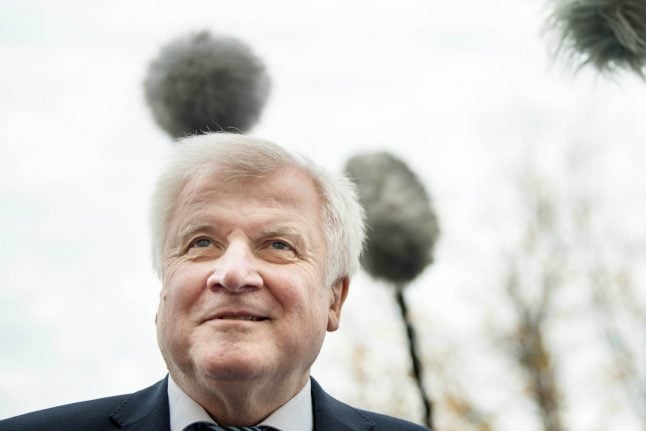The headline in German publication Zeit Online said it all: “Na, endlich.” – 'Well, finally.”
Since the CSU suffered historic losses in the Bavaria elections last month, there's been speculation on the 69-year-old's future in politics.
Now there's a bit more clarity.
Speaking to reporters in Bautzen, Saxony, on Monday Seehofer confirmed his decision to quit as head of CSU, which he has led since 2008.
“I will resign as party leader – this decision has been made”, he said, reported Zeit Online.
However, he denied a planned resignation from his role as Interior Ministry before his term ends in 2021, which some German publications had been speculating on.
“I am the Federal Minister of the Interior and will continue to hold this office. The office of the Federal Minister of the Interior is in no way affected by this decision,” he said.
On Sunday evening, Seehofer had informed top CSU leaders of his decision. The information was leaked to the press shortly after.
German media reported that he would step down at the beginning of 2019 and that a new leader would be elected at a special party conference.
However, Seehofer said that the timeline of his resignation as CSU leader had not yet been determined. A decision and statement will be released this week.
After he leaves, it's most likely that Bavaria's Prime Minister Markus Söder will take the top spot in the CSU party.
SEE ALSO: A new chapter begins in Bavaria after historic CSU losses – can the party stay afloat?
Why now?
Seehofer's resignation is not a huge surprise. He's been facing mounting pressure from party members to quit since the disastrous election results achieved by the CSU in the state elections in Bavaria on October 14th.
The party dropped 10 percentage points, to achieve 37.2%, its worst result since the 1950s.
The CSU is now dependent on the Free Voters as coalition partners after losing its absolute majority.
But there's more. Seehofer tried out some risky tactics recently, including threatening to quit if Germany didn't take a tougher stance on migrants and refugees.
Although he hoped it would win back right-wing voters who had drifted away from the party in the direction of Alternative for Germany (AfD), he was criticized for endangering the coalition and making Germany unstable.
SEE ALSO: Analysis – Is one man about to collapse German politics as we know it?
Meanwhile, the case of Hans-Georg Maaßen, the former head of Germany's domestic security intelligence agency, has also been a thorn in the side of Seehofer.
The CSU leader stood by Maaßen after he gave an interview to a newspaper, contradicting Angela Merkel and the government.
After Maaßen was sacked and controversially promoted, a deal was eventually reached where the domestic intelligence specialist would become an adviser in the Interior Ministry office.
But after Maaßen's farewell speech, in which he took aim at the government, came to light, he lost the role that Seehofer had found for him.
The whole debacle caused some damage to Seehofer's reputation.
SEE ALSO: Why Germany's controversial spy chief is finally being pushed out
The debate over Seehofer's future was further fuelled – and his resignation likely accelerated – by Chancellor Angela Merkel's announcement that she would hand over the CDU chairmanship in December.
Many commentators believed it was high time that Seehofer gave up his power too.
The Greens in the Bundestag demanded his immediate resignation from the Interior Ministry. “Every day that Horst Seehofer remains Interior Minister is one day too many,” faction leader Katrin Göring-Eckardt told the Tagesspiegel on Monday.
SEE ALSO: The end of an era: What you need to know about Merkel's planned departure




 Please whitelist us to continue reading.
Please whitelist us to continue reading.
Member comments